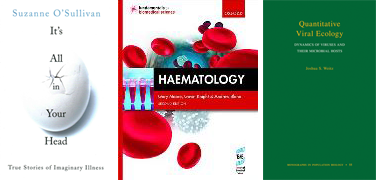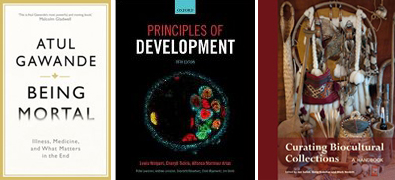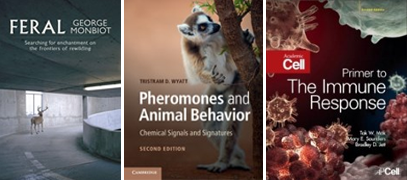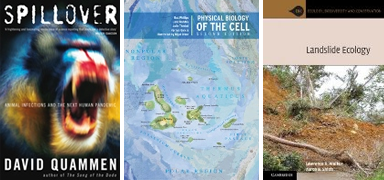Book Awards
The Book Awards ran from 2013-2016 and celebrated outstanding biology books for the general reader, as well as exceptional undergraduate and postgraduate textbooks.
There were three categories:
General Biology Book Prize
A prize of £500 for an accessible, engaging and informative life sciences book written for a non-specialist audience.
Undergraduate Textbook Prize
A prize of £500 for an outstanding life sciences textbook for undergraduates. Cost, readability and accuracy of information for students will be the most important considerations.
Postgraduate Textbook Prize
A prize of £500 for an outstanding life sciences textbook for postgraduates. Cost, readability and accuracy of information for students will be the most important considerations.
Winners in 2016

Congratulations to the 2016 winners who were celebrated at the Biology Week Annual Awards Ceremony. Find out which other superb titles made the shortlist.
Judges in 2016
General Biology Book Prize
Victoria Gill
Vic is a producer/reporter for the BBC website, writing feature stories - primarily about science and ethics. Vic followed a neuroscience degree from the University of Edinburgh with a science communication masters from the University of West of England.
Dr William Marshall CBiol FRSB
William was clinical director of pathology and consultant clinical biochemist at The London Clinic, a leading London independent hospital. He is author of the standard UK undergraduate and postgraduate textbooks in clinical biochemistry and has contributed to and edited several books for the Association for Clinical Biochemistry.
Dr Rebecca Nesbit MRSB
Following a biology degree from Durham University, Rebecca studied butterfly migration at Rothamsted Research. Since her PhD she has had varied roles in science communication, and she currently works with the Nobel Prize Inspiration Initiative. Her first novel, A Column of Smoke, was published in 2014.
Undergraduate Textbook Prize category:
Dr Clare Miller
Clare is a senior lecturer in microbiology at the University of Lincoln where her research involves utilising a range of biophysical techniques to study interactions between antimicrobial agents and bacterial cells. She is also interested in the dissemination of microbiological information through traditional and social media. Before working in higher education she was a teacher and continues to work as a senior GCSE science examiner.
Professor Jenny Morton FRSB
Jenny is professor of neurobiology at the University of Cambridge. She is based in the Department of Physiology, Development and Neuroscience where she works on Huntington's disease using mouse and sheep models. She is particularly interested in sleep and circadian disorder, as well as cognitive decline in neurodegenerative diseases. She is director of studies in medicine and veterinary medicine at Newnham College, Cambridge, where she also teaches pharmacology to undergraduates
Dr David Slingsby CBiol FRSB
David was chair of education for the British Ecological Society for 9 years and recently stepped down as editor of the Journal of Biological Education. He is a senior biology A level examiner, and a tutor with the OU on three modules (evolution, ecosystems and human biology). He has over 30 years' experience as a biology teacher.
Postgraduate Textbook Prize category:
Ian Carter CBiol MRSB
Ian followed a zoology degree from Durham University with several years' research experience in Brunei and Sarawak looking at rainforests, and then a PGCE at Cambridge University. He is a Fellow of the Galton Institute, which is involved in human genetics research, a major current interest. He has been chief examiner for S level, principal examiner for A level, a question setter for AEA papers and chief examiner for the Government KS3 Science papers. He continues to contribute articles to The Biologist and the Journal of Biological Education and is currently associate editor of the School Science Review.
Dr Sue Howarth CBiol FRSB
Sue is a senior lecturer in secondary science education at the University of Worcester and a Fellow of the Royal Society of Biology. Before working in higher education she was a teacher and won the Society's Teacher of the Year Award. She has been on the Publications Committee of the Association for Science Education, and the Editorial Board of The Biologist for several years and is currently an editorial associate for School Science Review.
Dr Ian Turner MRSB
Ian is a senior lecturer and deputy head of the Department of Natural Sciences at the University of Derby. Ian is National Teaching Fellow and passionate about, innovative teaching and assessment in higher education. Ian has a range of research and professional interests from science communication, gamification to pedagogy.
Our 2015 winners were celebrated at the Biology Week Annual Awards Ceremony

Our 2014 winners received their prize at a London Annual Awards Ceremony

Congratulations to our inaugural winners in 2013



